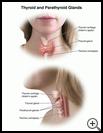
Thyroid Gland Removal (Thyroidectomy)
________________________________________________________________________
KEY POINTS
- A thyroidectomy is surgery to remove all or part of the thyroid gland, which is in the lower front of your neck. Your healthcare provider may remove all or part of your thyroid gland to treat an overactive thyroid, a thyroid nodule (lump in your thyroid), or thyroid cancer.
- Tell your healthcare provider about all medicines and supplements that you take. Ask your healthcare provider if you need to avoid taking any medicine or supplements before the procedure.
- Ask your healthcare provider how to take care of yourself at home, what symptoms or problems you should watch for, and what to do if you have them.
________________________________________________________________________
What is a thyroidectomy?
A thyroidectomy is surgery to remove all or part of the thyroid gland.
The thyroid gland is a small gland in the lower front of your neck. It takes iodine from the food you eat to make hormones. The thyroid hormones help control how your body uses energy.
When is it used?
You may need to have part or all of your thyroid gland removed if:
- You have a lump in your thyroid gland that could be cancer. If cancer is found, removal of the gland may keep the cancer from spreading.
- Your thyroid gland is overactive and making too much thyroid hormone (a problem called hyperthyroidism).
Ask your healthcare provider about your choices for treatment and the risks.
How do I prepare for this procedure?
- Make plans for your care and recovery after you have the procedure. Find someone to give you a ride home after the procedure. Allow for time to rest and try to find other people to help with your day-to-day tasks while you recover.
- Follow your provider's instructions about not smoking before and after the procedure. Smokers may have more breathing problems during the procedure and heal more slowly. It is best to quit 6 to 8 weeks before surgery.
- You may or may not need to take your regular medicines the day of the procedure. Tell your healthcare provider about all medicines and supplements that you take. Some products may increase your risk of side effects. Ask your healthcare provider if you need to avoid taking any medicine or supplements before the procedure.
- Tell your healthcare provider if you have any food, medicine, or other allergies such as latex.
- Your provider will tell you when to stop eating and drinking before the procedure. This helps to keep you from vomiting during the procedure.
- Follow any other instructions your healthcare provider gives you.
- Ask any questions you have before the procedure. You should understand what your healthcare provider is going to do.
What happens during the procedure?
This procedure will be done at the hospital.
You will be given general anesthesia to keep you from feeling pain. General anesthesia relaxes your muscles and you will be asleep.
Your healthcare provider will make a cut in your neck just above the collarbone. He or she will then remove all or part of the gland. Lab tests will be done right away during the procedure to check for cancer. Based on the test results, your provider may end the operation or may remove another part or all of the thyroid gland. The cut in your neck will then be closed.
A drain is usually left in the wound to remove any blood that may collect. The drain is removed in 2 to 3 days.
Rarely, thyroid cancer spreads to lymph nodes. If cancer is found during the procedure, the lymph nodes will be removed. If your lymph nodes become enlarged later, you will need further treatment.
The procedure will take 1 to 3 hours.
What happens after the procedure?
You may be in the hospital for 1 or 2 days.
If all or a large part of the thyroid gland was removed, you will need to take thyroid hormone medicine for the rest of your life.
If you have cancer, you may need to take radioactive iodine medicine to destroy any remaining thyroid tissue and cancerous cells.
Ask your healthcare provider:
- How and when you will get your final test results
- How long it will take to recover
- If there are activities you should avoid and when you can return to your normal activities
- How to take care of yourself at home
- What symptoms or problems you should watch for and what to do if you have them
Make sure you know when you should come back for a checkup. Keep all appointments for provider visits or tests.
What are the risks of this procedure?
Every procedure or treatment has risks. Some possible risks of this procedure include:
- You may have problems with anesthesia.
- You may have infection or bleeding.
- The nerves that control your speech may be injured. Damage to the nerves could make your voice hoarse. The damage may be temporary or lifelong.
- The parathyroid glands may be injured when all of the thyroid gland is removed. The hormones made by the parathyroid glands control the amount of calcium and phosphorus in the blood. You need to have the right levels of calcium and phosphorus in your blood so your nerves and muscles work well. If the parathyroid glands cannot function after the operation, you may need to take calcium pills or hormones.
- If thyroid cancer is found, it can return to the neck or other parts of the body. Fortunately, removal of the thyroid gland usually keeps this from happening.
Ask your healthcare provider how the risks apply to you. Be sure to discuss any other questions or concerns that you may have.

